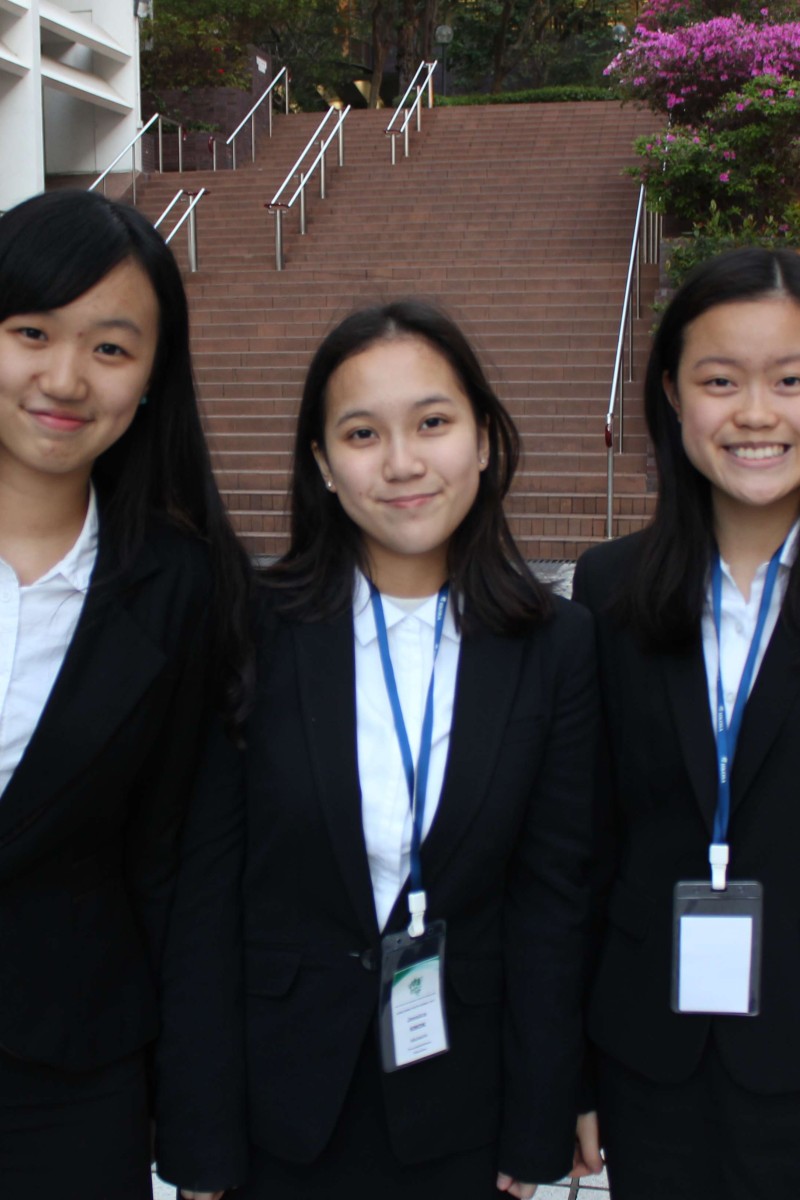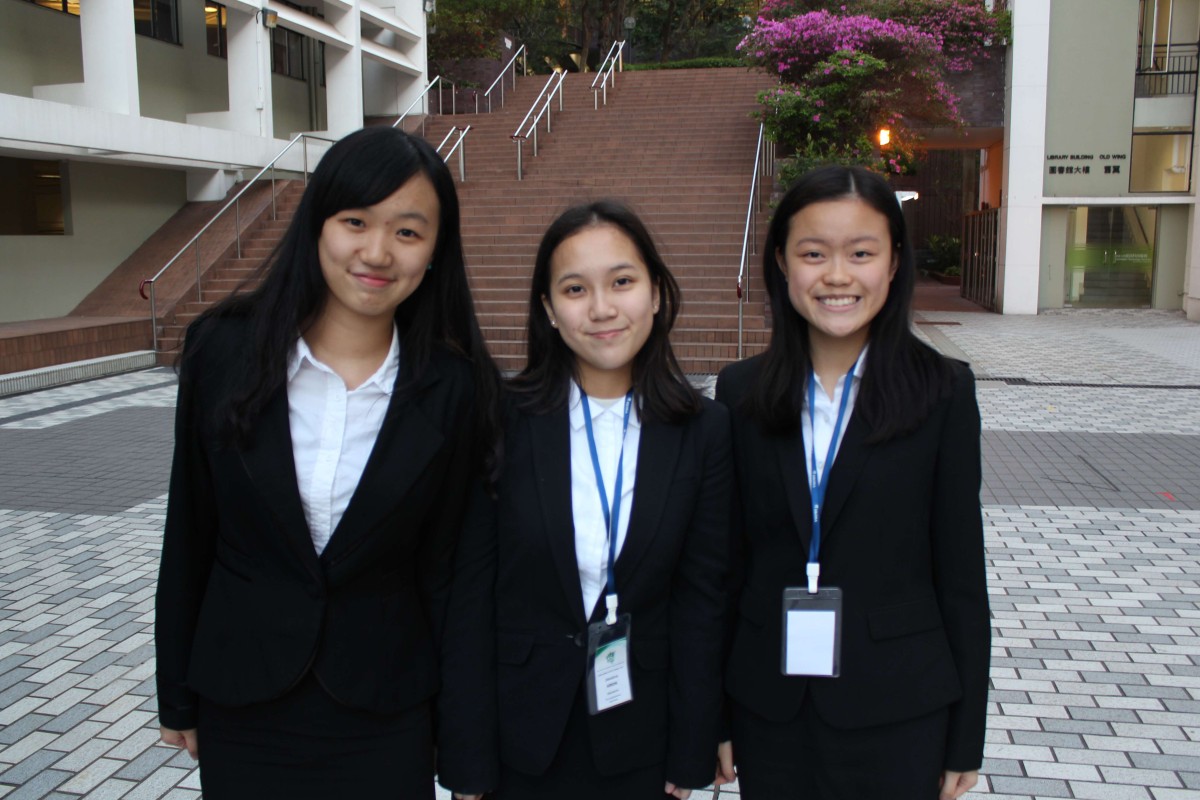
Forget marching, protesting, banner waving – the Hong Kong Youth Summit 2017 is where the voices of the next generation are being heard
 (L-R) Angela’s, Jessica’s and Whitney’s proposals will be put forward to the government.
(L-R) Angela’s, Jessica’s and Whitney’s proposals will be put forward to the government. If you think of protests and activism when you think about young Hongkongers taking a stand, stating their opinions and making their voices heard, you wouldn’t be wrong – but you wouldn’t entirely right either. They aren’t the only platforms that young people in the city have access to. From March to early April, the University of Hong Kong played host to the Hong Kong Youth Summit 2017, which was commissioned by Hong Kong Outstanding Students’ Association (HKOSA). The summit was held to provided a safe space for students to discuss current issues affecting them.
Young Post spoke to the three best speakers, Jessica Kwok Wing-yan, Angela Lie Shut-yan and Whitney Lo Wing-lam, of the 100 or so secondary school and university students that participated. Their suggestions will be put forward to the government as official proposals.
Angela, 16, is a student from Tsuen Wan Public Ho Chuen Yiu Memorial College. She came up with a way to tackle the lack of urn spaces – where the ashes of the dead are stored – in Hong Kong. Angela proposed that people start conducting “green burials”, where they store the ashes of the deceased in jewels that can be worn or displayed.
Hong Kong has a rapidly ageing population, and with 40,000 cremations each year, urn niches are getting scarcer.
“People wait a long time for a public urn space to be given to them thanks to the current lottery system of allocating public niches. People have been opting to deal with ashes in various ways, like scattering them into the sea. Putting them in jewels, I believe, could relieve the huge demand on columbariums [a room or building with niches for funeral urns to be stored],” said Angela.
When asked if the older, more traditional folk would object to her proposal of storing their ashes in jewels, Angela agreed that her suggestion goes against tradition, but that it would merely be offered to Hongkongers as another option. “It’s environmentally friendly so it might win favour with green groups, and they could start campaigns to inform and educate others about the benefits. I also think it’s just another way of memorialising and remembering our lost loved ones,” she added.
Angela said that there are also those in the city that are more open to the idea – especially young people. “I believe that our problems with insufficient burial spaces is something that needs to be tackled immediately. By working with the government or with non-governmental organisations, we could promote the benefits of a ‘green burial’ and clear up any misunderstandings about the whole process.”
Jessica is a student from Ying Wa Girls’ School. She wants the government to tackle the issues surrounding sub-degree courses (like associate degrees and higher diplomas programmes), which have been seen as less credible than actual degrees by potential employers.
“A student isn’t guaranteed a steady job or a good future even if they have a university degree anymore, never mind a sub-degree,” Jessica, 16, said. “Many students, like me, are worried because we consider sub-degree courses an alternative route to further education if we’re denied a place at a publically funded university.”
Jessica proposed that a recruitment day for people with sub-degree qualifications ought to be held. She also suggested that many sub-degree courses ought to be reformed so that they focused more on developing vocational skills and offered internship opportunities. “Sub-degree courses are as valuable in their own right as an actual university course, and employers ought to judge graduates of these courses the same way they would a university graduate,” she said.
There are, Jessica allowed, drawbacks to her proposal. One of the major limitations to her proposal is that it would be costly, because it would mean overhauling the sub-degree programme content.
“I think the government should take the lead in supporting sub-degree graduates. Back in 2000, they initiated reforms intended to diversify pathways to higher education, and to increase sub-degree courses, so they should continue to fund and support them now. They could, for example, increase internship opportunities, or even offer jobs in within the government for graduates.”
More importantly, Jessica added, she wants to know that her opinions to be heard, and for her voice to be acknowledged. “There are some out there who think we’re being radical and unrealistic. In Hong Kong the voice of the youth seems to be utterly disregarded and devalued, and we don’t have a platform to express ourselves in a way that means we’ll be listened to,” she said.
Whitney, 15, is from Diocesan Girls’ School and wants to rework the current retirement protection scheme. Rather than having the non-universal scheme that’s in place at the moment (in which only those with financial needs are covered), there should be a universal scheme where all eligible elderly people aged 65 or above would receive about HK$3,000 per month.
“I was impressed with what former lawmaker Frederick Fung Kin-kee, the Youth Summit’s guest speaker, said. He said that receiving the fund was a human right, and that we shouldn’t even be considering the non-universal option,” said Whitney.
When asked if enterprises ought to be willing to contribute more, Whitney said they should be taking on more social responsibilities.
Tristan Lau Chun-shing, the HKOSA president, said we ought to be valuing the youth voice more. “The youth summit gave young people a chance to express themselves and to voice their concern for people in need. We’ve always impressed upon them that ‘Hong Kong needs you’. One day, these young people will grow up and they might end up work in influential positions, like the government. If that happens,” he added, “We hope they won’t forget what it’s like to be a young person who wants to be heard.”